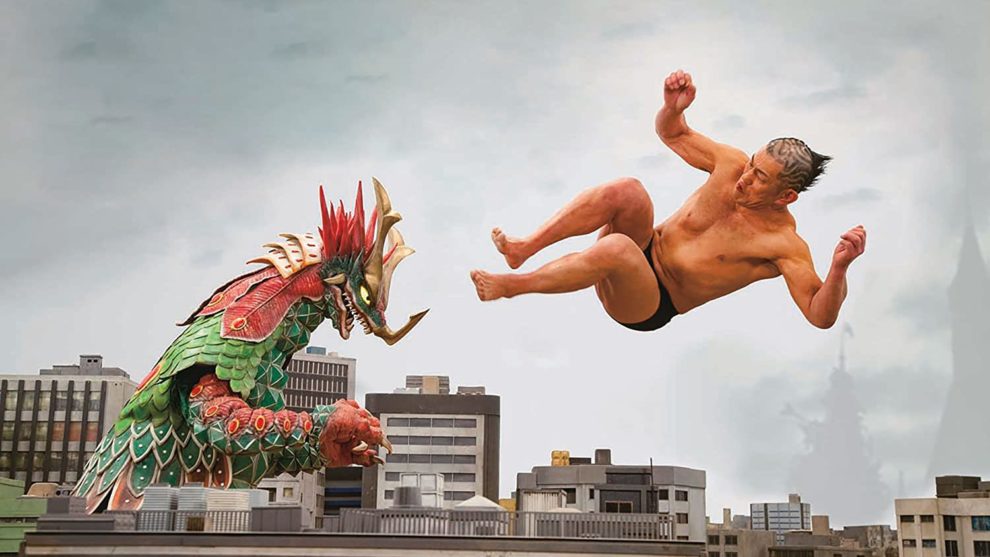Minoru Kawasaki's films have always been silly as much as entertaining, with his tendency to portray various professional humans (company employees, wrestlers, goalkeepers, chefs etc) in animal form, having drawn joyous laughter by all audience that enjoy cult parody. This time his approach deals with the kaiju-tokusatsu theme, in a film that parodies “Godzilla” (Resurgence) as much as Kawasaki's own films.
Kaiju Mono will be available from Terracotta Distribution
The story starts with a film crew from SpiritSpots.com entering Specter Pass in Mount Myojin, where strange lights have been reported to appear recently. During their search, they are warned by the mysterious Professor Nindo Izumi not to proceed. However, they pay no attention to him and soon end up dead by a gigantic creature that emerges from the ground. All the while, reports for abnormal weather around the globe, earthquakes in Mount Myojin and the reemergence of ancient plants are all over the news, just like Dr Saigo's announcement on his invention of Setupp X Cell.
A few days later, Dr Saigo, accompanied by his daughter Miwa, convinces his assistant to become a live test subject for his serum, and a reluctant Hideto Nitta accepts, after the doctor uses his affection for Miwa to convince him. Nitta transforms into a giant wrestler, just when the mountain monster, named Mono by the leader of a kaiju rights organization, starts moving towards Tokyo. Using wrestling moves, giant-size Nitta manages to win, and soon finds himself retaining his muscular built even without the size, and being the center of attention for every news agency but also female fans, including Lisa, a gorgeous but also shady stranger that soon approaches him. In the meantime, Mono has not told its last word, while at Anti-Kaiju Mono Headquarters, Japan's leading biologist and defense officials try to find ways to get rid of the monster once for all, although they stumble upon conspiracies on an international level.
The aforementioned silliness and parody permeate the whole narrative, with Minoru Kawasaki mocking a number or tropes Godzilla movies implemented through the years, including the role of the press, the scientists' and government officials' efforts to find the reasons behind the attack and ways to fight against the monster, as much as the whole concept of conspiracies, which was mostly present in the first films of the series. His approach, however, does not stop there, as the narrative also deals with the undergarments Giant Nitta wears, the concept of popularity in the social media world and even geriatrics as the source of a peaceful solution. Add to that military officials singing and trying to make various people laugh, the presence of fashion models (Miki Kawanishi as Miwa) and professional wrestlers (Kota Ibushi as muscular Nitta and Saki Akai as Risa), and the overall intense coloring of the film, and you have the backbone of a movie that looks both silly and impressive at the same time.
All these however, are also encapsulated in a playful retro essence, which begins with the design and the actual costume of the monster and finds its apogee in the various tropes of the script, including the mad scientists, the spies and the man against monster concept.
Some mocking social comments about the curiosity of youths and their lack of listening to their elders, and the whole concept of activism do appear in the narrative, but are again buried deep inside all the aforementioned concepts.
Not much more to say, if you like kaiju/tokusatsu movies and particularly “Godzilla” and enjoy parodies, “Kaiju Mono” is the perfect film for you. PS. Also note the ending song, it is quite good















